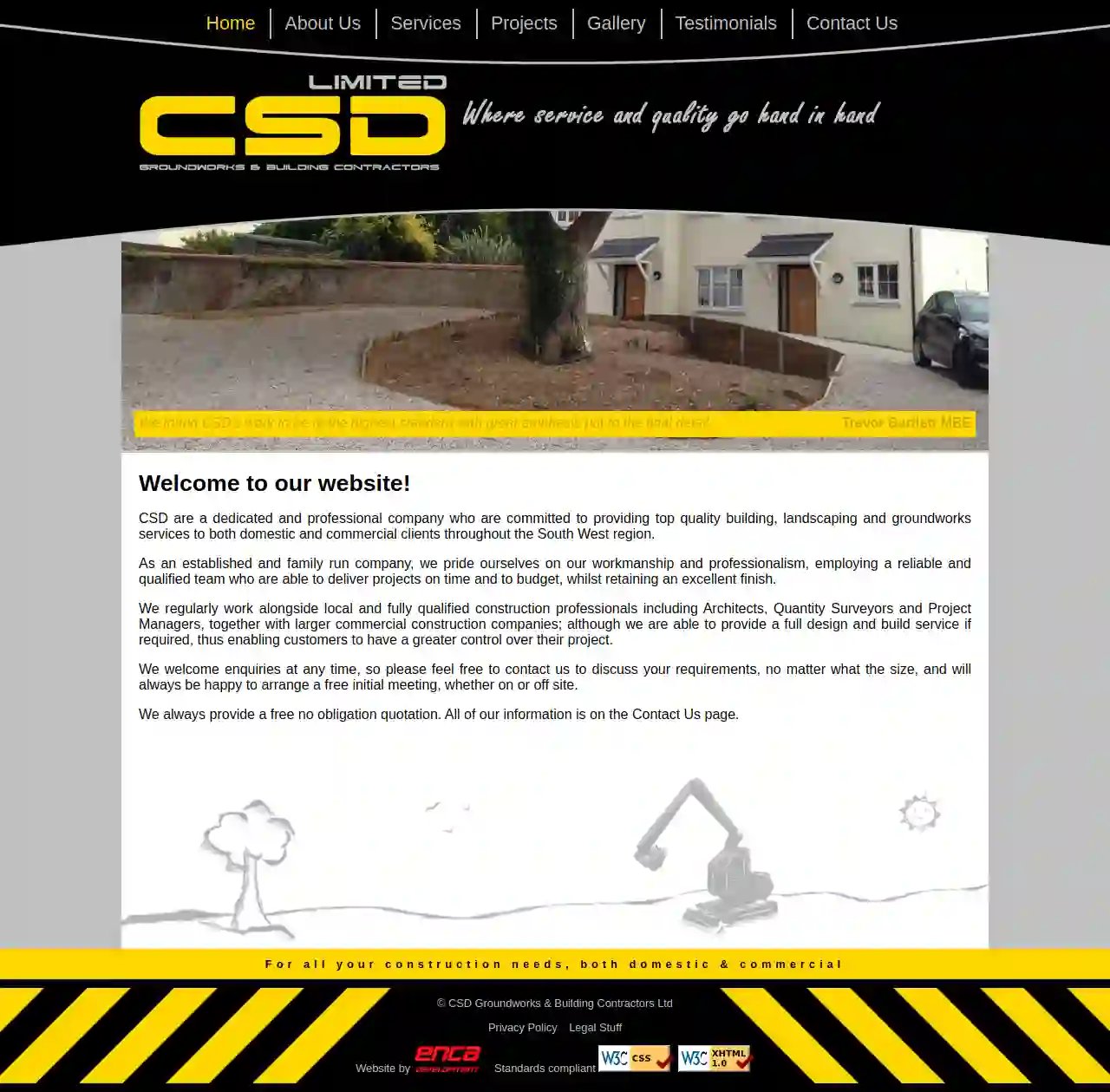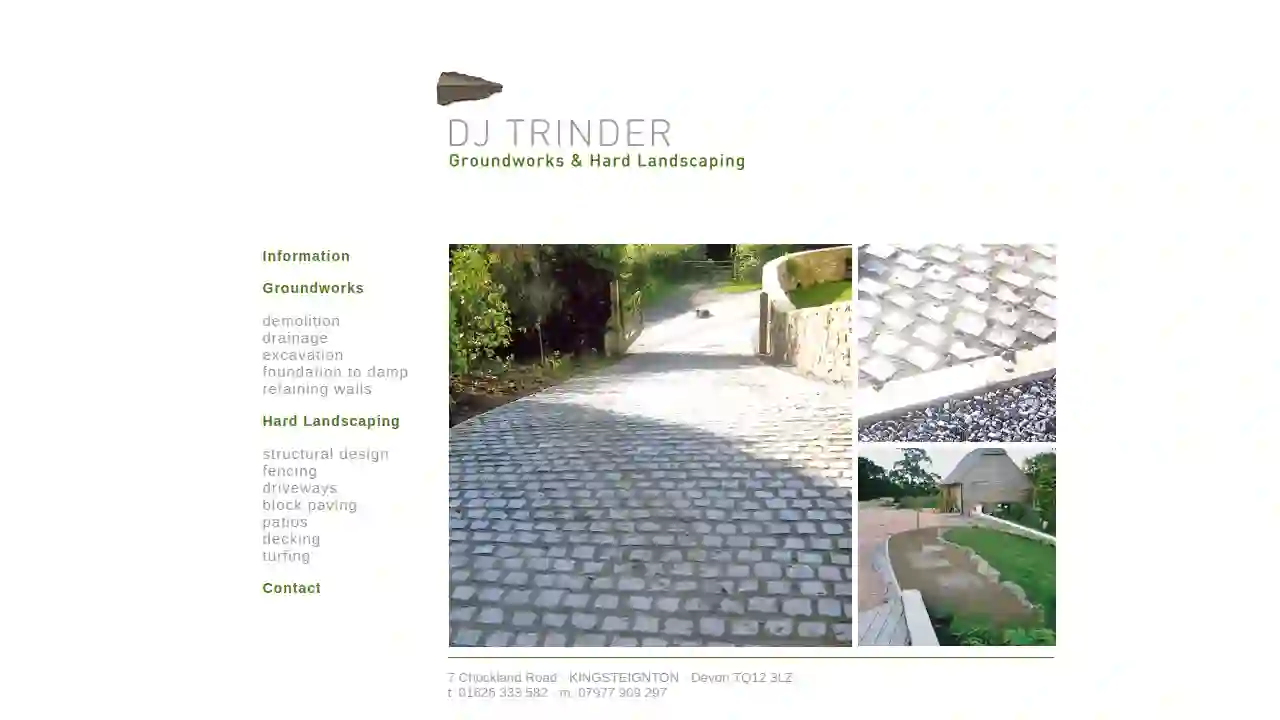Excavation Contractors Tavistock
Top Excavating Contractor in Tavistock
Get up to 3 Excavation Company Near Me quotes for your project today! Compare profiles, reviews, accreditations, portfolio, etc... and choose the best deal.

Knowle Hill Recycling Centre
3.549 reviewsKnowle Hill Recycling Centre, Exmouth, Knowle Hill Recycling CentreExmouth, EX8 5BP, GBKnowle Hill Recycling Centre Knowle Hill Recycling Centre is a convenient and efficient way to dispose of your unwanted waste. We offer a wide range of services, including: Recycling of a wide range of materials Disposal of chargeable waste A reuse shop where you can purchase reusable goods A van permit system for commercial vehicles We are committed to providing a safe and efficient service for all our users. Our site staff are on hand to provide assistance when reasonable, but they are unable to lift excessively heavy and/or awkward loads. Please ensure that your waste is separated before arriving at the site.
- Services
- Why Us?
- Gallery
Get Quote
CSD Groundworks & Building Contractors Ltd
51 reviewsExeter, GBAbout CSD CSD Groundworks & Building Contractors Ltd is a dedicated and professional company committed to providing top-quality building, landscaping, and groundworks services to both domestic and commercial clients throughout the South West region. Established and family-run, we take pride in our workmanship and professionalism, employing a reliable and qualified team capable of delivering projects on time and within budget, while maintaining an excellent finish. We regularly collaborate with local and fully qualified construction professionals, including Architects, Quantity Surveyors, and Project Managers, alongside larger commercial construction companies. We can also provide a full design and build service if required, giving customers greater control over their projects. We welcome inquiries at any time. Feel free to contact us to discuss your requirements, regardless of size. We're always happy to arrange a free initial meeting, whether on or off-site. We also offer free, no-obligation quotations.
- Services
- Why Us?
- Accreditations
- Testimonials
- Gallery
Get Quote
Skyscape Construction
Skyscape ConstructionExeter, England, United Kingdom, Exeter, GBSkyscape Construction: Transforming Spaces with Excellence Skyscape Construction is a small, friendly construction company based in Devon, dedicated to creating outstanding buildings and spaces. With years of experience, our team of experts is committed to excellence, innovation, and sustainability in every project. We believe in building not just structures, but lasting relationships with our clients, by ensuring transparency, reliability, and exceptional customer service. From residential to commercial projects, Skyscape Construction is your partner in bringing your architectural dreams to life. Our journey began as individuals working for an employer, and has since expanded to a professional partnership based in the Southwest of England. We have established a reputation for excellence and innovation in every project we undertake. Our team members bring a wealth of expertise in carpentry, brick laying, groundwork’s, stone masonry, plastering, and landscaping. Each member is dedicated to delivering exceptional craftsmanship and attention to detail in every project. With a focus on transparency, reliability, and exceptional customer service, we take pride in offering tailored residential and commercial construction, as well as comprehensive renovations. Our commitment to excellence has earned us the trust of our clients leading to repeat business.
- Services
- Why Us?
- Gallery
Get Quote
T D R Summers Ltd
4.58 reviewsWells Fargo, Nutaberry, Bideford, Devon, EX39 4DT, GBTDR Summers - building a future for success Apprenticeships and vocational training at North Devon College are a family tradition for builders TDR Summers. Royston Summers started it all 34 years ago when he completed a City and Guilds in Building at the college. He has worked as a mason ever since, covering all aspects of the trade, working initially for AF Beer then AA Beer. Latterly he has been self employed for several years. Sons Tim and Dan Summers followed their father into the construction industry, supported by training at NDC. Tim, 27, completed the apprenticeship in Trowel Occupations, then an advanced apprenticeship and went on to higher education with an ONC in Building Studies. Brother Dan, 25, followed an apprenticeship path in Wood Occupations at foundation and advanced level, before going on to achieve an ONC in Building Studies and an HNC in Construction. Both students excelled in their separate vocations: Tim won the Lou Drake Award for Best Mason in 1998 Dan won the UCATT Cup for Woodworking (under 18 years) in 2001, the Tony Layzell Memorial Cup for Woodworking in 2002 and the Professional Studies Peter Stone Award in 2004 Tim says "I automatically wanted to do my apprenticeship to learn the family trade. The quality training at college had structure and complemented what I was learning on site". Dan added "You definitely need the combination of site and college training to succeed. I really enjoyed learning the theory alongside developing practical skills". Tim put his management talents to good use, deciding to set up a family business in 2004, with Royston joining in 2005. Dan joined in 2006 bringing his complimentary skills to the firm. Since then TDR Summers has grown from strength to strength and established itself as a reputable company through the combination of skilled craftsmen and the delivery of quality service to the local community. Work is mainly small residential extensions, some new builds and loft conversions. The commitment to providing excellent standards to customers is endorsed by the growing client base of satisfied customers. "We are very grateful to you once again for your services" Mr H, Fremington "Superb job .... we really are thrilled!" (Mrs T, Yelland). Now TDR Summers is growing with the additional skills of younger brothers Tom 16 and Jamie, 23, currently doing apprenticeships in Trowel and Wood Occupations respectively. Dan says "The business is doing extremely well and we have been able to take on two of our younger brothers as apprentices. It's great to see the family tradition continuing".
- Services
- Why Us?
- Our Team
- Testimonials
- Gallery
Get Quote
A and M Groundworks | Building Contractors Exeter
3.928 reviewsExeter, GBGroundworks Contractors in Exeter Initiating any construction project begins with establishing a solid foundation. This process involves deep excavations, levelling, grading, soil stabilisation, and the installation of underground drainage systems. Achieving robust groundwork requires meticulous attention to detail, expert supervision, and precise execution – hallmarks of A&M Groundworks. With a wealth of experience in delivering top-notch groundworks in Exeter, we handle a wide range of projects, helping private and public sectors augment land utilisation by employing state-of-the-art technology. Contact us for a quote and discuss your project with our professional engineers to achieve the highest quality finish at the most competitive price. More About Us 15 Years Experience Services Bespoke Work by Craftsmen
- Services
- Why Us?
- Testimonials
- Gallery
Get Quote
SSBC Contractors Ltd
56 reviewsSSBC Unit 10, Summers Yard, Caddsdown Industrial Estate, Bideford, North Devon, EX39 3GE, GBSSBC – Building & Carpentry Contractors SSBC Building and Carpentry Contractors is a renowned one stop company for all your building and construction needs. We provide all construction services in-house and undertake all types of construction services that include new builds, extensions, renovations and general property maintenance. Over the years, as we have evolved into a complete building services for domestic and commercial clients. We aim to provide affordable and professional services throughout Devon, Cornwall and Somerset. We are fully committed to providing our clients with services that exceed their expectations and ensure they receive the best possible added value. We take pride in every job we do and work hard to provide the very best quality and finishes.
- Services
- Why Us?
- Gallery
Get Quote
D J Trinder Groundworks
7 Chockland Road, KINGSTEIGNTON, TQ12 3LZ, GBAbout DJ Trinder DJ Trinder is a family-run business with over 20 years of experience in the construction industry. We offer a wide range of services, from groundworks and demolition to landscaping and fencing. We are committed to providing our clients with high-quality workmanship and excellent customer service. Our Services We offer a wide range of services to meet your needs, including: Groundworks Demolition Drainage Excavation Foundation to damp Retaining walls Hard Landscaping Structural design Fencing Driveways Block paving Patios Decking Turfing Our Team Our team of experienced and qualified professionals is dedicated to providing you with the best possible service. We are committed to working closely with our clients to ensure that their projects are completed to the highest standards. Our Commitment We are committed to providing our clients with: High-quality workmanship Excellent customer service Competitive prices A professional and reliable service
- Services
- Why Us?
- Gallery
Get Quote
CAB Construction SW LTD
51 reviewsExeter, GBTransforming the South West with Timely, Efficient & Affordable Construction Solutions At CAB Construction SW Ltd, we are your reliable and experienced construction partner, catering to projects of all sizes across the South West of England. Whether it’s a small residential renovation or a large-scale commercial development, we have the expertise to deliver outstanding results. ABOUT US: As a fast-growing, family-run business based in Okehampton, Devon, we take immense pride in serving both domestic and commercial clients. With over 25 years of combined experience in the building and construction industries, our skilled team has forged strong partnerships with main contractors, local authorities, and private developers. RELIABLE SERVICE: The success of your project is our priority. We value prompt and responsive communication, ensuring your needs are met and deadlines are achieved. Count on us to deliver projects on time and within budget. EXPERTISE YOU CAN TRUST: When you choose CAB Construction SW, you benefit from the wealth of knowledge and experience possessed by our team. Across various sectors, we have tackled diverse construction challenges, making us adept at handling any project with precision and efficiency. FULLY INSURED FOR YOUR PEACE OF MIND: Safety and meticulous planning are ingrained in every aspect of our work. We are fully insured with Public Liability Insurance, assuring the protection of your property and work site throughout the construction process. No matter the scale of your project, CAB Construction SW is committed to providing the highest standard of service, superior craftsmanship, and attention to detail. Partner with us and let’s turn your construction vision into reality.
- Services
- Why Us?
- Testimonials
- Gallery
Get Quote
Devon Minor Works
56 NEWCOURT BARTON CLYST RD EXETER, Exeter, EX3 ODB, GBWelcome to Devon Minor Works – the leading name in Building & Maintenance. Serving the people and organisations of Exeter and Devon for over 25 years. For nearly 25 years we have been dedicated to the highest levels of service in small build, refurbishment, repair and maintenance. Our website aims to provide you with all you need to know about our service and please do get in touch if you have a project in mind. Customers often ask what we mean by ‘minor works’. The answer: when your job is probably too small for large, and often impersonal, companies, and when you’re still looking for the same level of service and professionalism, that’s where Devon Minor Works fits in – flexible, friendly and sensibly priced for contracts up to £50,000. We take pride in being exclusive to Exeter and Devon! We pride ourselves on being a local company; this is our home, our place of work and where we stand or fall by our long term reputation. It’s reassuring to know that Devon Minor Works is a member of the Federation of Master Builders, the leading standard for quality and good working practice. And A Member of the Painting and Decorating Association. Steve Coomber – Director Managing Director, Steve Coomber has lived in Exeter all of his life and is well known as a charming and dedicated professional, as well as for his charitable works in the City. “But Steve wishes you to know that he didn’t write this bit!!” – Aylwyn Bowen – Exeter Street Art.
- Services
- Why Us?
- Our Team
- Gallery
Get Quote
Render Dry Ltd
5 Heath Hill, Heathfield, Newton Abott, Devon, TQ12 6SP, GBRender Dry Ltd Render Dry Ltd is a complete building and property maintenance service covering the South West. We offer a design and build service to suit all budgets, with a quality team of builders specializing in extensions, renovations, loft conversions, and barn conversions. We have many years of experience in the construction industry and cover all trades using our own team of tradesmen and local subcontracted tradesmen. We have worked with many clients in the South West on various projects, from maintenance contracts for Nursing Homes and Residential care homes to domestic clients seeking to build extensions, convert lofts, garages, and barns. We have also carried out many insurance contracts for a local loss adjuster firm and carry out many building repairs, ranging from leaking gutters to complete renovations. If you are looking for reliable, affordable, local, top quality tradesmen, then Render Dry are the team you need. We offer a complete building and maintenance service for commercial and domestic properties. Covering the South West. Design and build service to suit all budgets. Extensions, renovations, loft conversions, barn conversions. Please get in touch to discuss your requirements, as we're sure we can help.
- Services
- Why Us?
- Testimonials
- Gallery
Get Quote
Over 13,059+ Excavation Pros registered
Our excavation experts operate in Tavistock & surroundings!
ExcavationHQ has curated and vetted the Best Excavation Businesses in and around Tavistock. Find the most trustworthy business today.
Frequently Asked Questions About Excavation Contractors
- Clearly Define the Scope: Outline the project's goals, including the excavation area, depth, grade, and intended use.
- Obtain Necessary Permits: Research and acquire any required permits from your local authorities.
- Mark Utility Lines: Contact your utility companies to locate and mark underground utilities to prevent damage.
- Communicate with Neighbors: Inform your neighbors about the project's timeline and potential noise or disruptions.
- Prepare the Site: Clear any obstacles, such as vegetation, furniture, or structures, from the excavation area.
- Discuss Safety Protocols: Review safety procedures with the contractor to ensure a safe work environment.
- Basement Size: The larger the basement, the more excavation is required, increasing the cost.
- Soil Type: Excavating rocky or dense clay soil is generally more expensive than loose soil.
- Accessibility: Difficult-to-access sites might require specialized equipment or more labor, driving up costs.
- Foundation Type: The chosen foundation type (full basement, crawl space, slab) affects excavation needs.
- Underpinning: If underpinning (strengthening existing foundations) is necessary, it significantly increases costs.
- Disposal Fees: Hauling excavated soil to disposal sites adds to the overall expense.
- Sloped Property: Your property has a significant slope, making it prone to soil erosion or landslides.
- Creating Usable Space: You want to level off a sloped area to create a flat surface for patios, gardens, or other outdoor spaces.
- Preventing Damage: Erosion is threatening existing structures, driveways, or walkways.
- Landscaping Features: You're incorporating tiered gardens, raised beds, or other landscaping elements requiring soil retention.
- Mechanical Excavation: Utilizing heavy equipment like excavators, backhoes, bulldozers, and loaders, suitable for most projects.
- Hand Excavation: Using hand tools (shovels, picks) for smaller excavations or delicate work near utilities.
- Blasting: Employing explosives to break up rock or hard materials, typically for large-scale projects.
- Hydro Excavation: Using high-pressure water jets to loosen and remove soil, often used for locating utilities or delicate excavation.
- Vacuum Excavation: Employing a vacuum system to suck up excavated material, suitable for safe excavation near utilities or in confined spaces.
What should I do before excavation starts?
How much does it cost to excavate a basement?
How do I know if I need a retaining wall?
What are the different methods of excavation?
What should I do before excavation starts?
- Clearly Define the Scope: Outline the project's goals, including the excavation area, depth, grade, and intended use.
- Obtain Necessary Permits: Research and acquire any required permits from your local authorities.
- Mark Utility Lines: Contact your utility companies to locate and mark underground utilities to prevent damage.
- Communicate with Neighbors: Inform your neighbors about the project's timeline and potential noise or disruptions.
- Prepare the Site: Clear any obstacles, such as vegetation, furniture, or structures, from the excavation area.
- Discuss Safety Protocols: Review safety procedures with the contractor to ensure a safe work environment.
How much does it cost to excavate a basement?
- Basement Size: The larger the basement, the more excavation is required, increasing the cost.
- Soil Type: Excavating rocky or dense clay soil is generally more expensive than loose soil.
- Accessibility: Difficult-to-access sites might require specialized equipment or more labor, driving up costs.
- Foundation Type: The chosen foundation type (full basement, crawl space, slab) affects excavation needs.
- Underpinning: If underpinning (strengthening existing foundations) is necessary, it significantly increases costs.
- Disposal Fees: Hauling excavated soil to disposal sites adds to the overall expense.
How do I know if I need a retaining wall?
- Sloped Property: Your property has a significant slope, making it prone to soil erosion or landslides.
- Creating Usable Space: You want to level off a sloped area to create a flat surface for patios, gardens, or other outdoor spaces.
- Preventing Damage: Erosion is threatening existing structures, driveways, or walkways.
- Landscaping Features: You're incorporating tiered gardens, raised beds, or other landscaping elements requiring soil retention.
What are the different methods of excavation?
- Mechanical Excavation: Utilizing heavy equipment like excavators, backhoes, bulldozers, and loaders, suitable for most projects.
- Hand Excavation: Using hand tools (shovels, picks) for smaller excavations or delicate work near utilities.
- Blasting: Employing explosives to break up rock or hard materials, typically for large-scale projects.
- Hydro Excavation: Using high-pressure water jets to loosen and remove soil, often used for locating utilities or delicate excavation.
- Vacuum Excavation: Employing a vacuum system to suck up excavated material, suitable for safe excavation near utilities or in confined spaces.